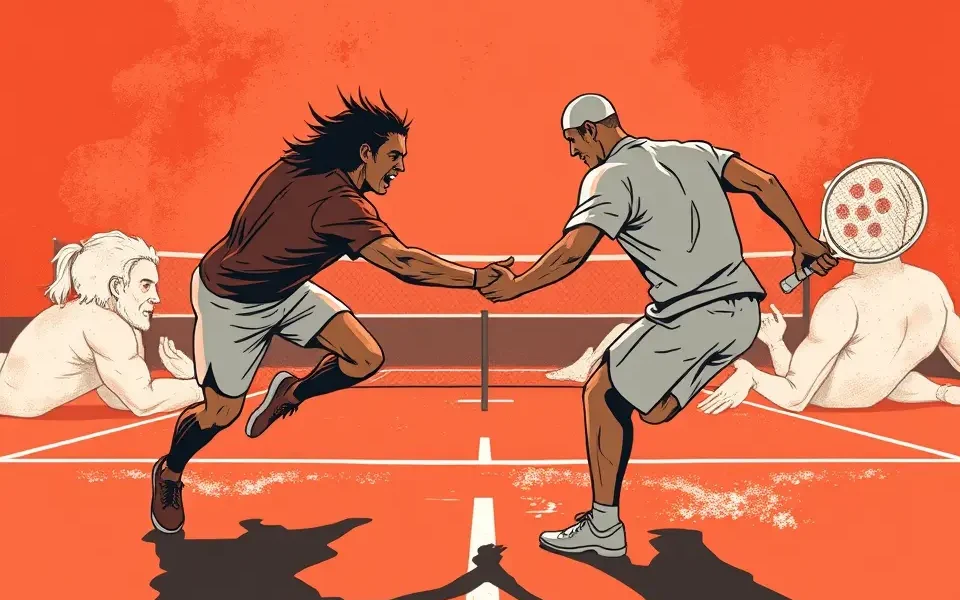The French Open, held annually at Roland Garros, is renowned for its grueling clay courts and captivating matches. Among these, the men’s singles final often delivers unforgettable battles of skill, endurance, and mental fortitude. Here’s a look at the longest French Open men’s singles finals in the Open Era, showcasing the remarkable athletes who have etched their names in tennis history.
The Newest Record Breaker: Alcaraz vs. Sinner (2025)
Time: 5 hours, 29 minutes
Year: 2025
Players: Carlos Alcaraz vs. Jannik Sinner
Score: 4-6, 6-7(4), 6-4, 7-6(7-3), 7-6(10-2)
The 2025 final between Carlos Alcaraz and Jannik Sinner wasn’t just a match; it was a spectacle that redefined endurance and athleticism in men’s tennis. Clocking in at an astonishing 5 hours and 29 minutes, this contest surpassed the previous record by nearly an hour, immediately claiming its place as the longest French Open final in the Open Era.
The Epic Battle Unfolds
The match began with Sinner seizing control, demonstrating his powerful baseline game and tactical acumen to win the first two sets. However, Alcaraz, known for his tenacity and versatility, clawed his way back into the match. The third and fourth sets saw Alcaraz elevate his game, matching Sinner’s intensity and turning the tide with stunning shot-making and unwavering focus. The atmosphere at Court Philippe Chatrier was electric as the match progressed into a fifth-set tiebreaker. Alcaraz dominated the final tiebreaker, securing his victory and etching his name in the record books.
Key Moments
- Sinner’s Early Dominance: Sinner’s early lead showcased his tactical prowess and powerful baseline game, putting Alcaraz on the defensive.
- Alcaraz’s Resilience: Alcaraz’s comeback was marked by incredible athleticism and mental fortitude, shifting the momentum in his favor.
- Fifth-Set Tiebreaker Domination: Alcaraz’s performance in the final tiebreaker sealed the victory, underscoring his ability to perform under immense pressure.
- Saving Championship Points: Alcaraz saved three championship points in the fourth set.
Significance
This match was more than just a final; it was a historic clash that underscored the evolving landscape of men’s tennis. With Alcaraz and Sinner representing the next generation of stars, their epic battle signified a new era of intense rivalries and unforgettable moments on the court. Jonathan Jurejko of BBC Sport hailed Alcaraz’s performance as “the finest of his career,” with commentators suggesting it could be “the match of the decade, and maybe the century”.
Wilander vs. Vilas (1982)
Time: 4 hours, 42 minutes
Year: 1982
Players: Mats Wilander vs. Guillermo Vilas
Score: 1-6, 7-6(6), 6-0, 6-4
Before 2025, the record for the longest French Open men’s final belonged to Mats Wilander and Guillermo Vilas. Their 1982 clash lasted 4 hours and 42 minutes, a testament to their endurance and competitive spirit.
A Test of Wills
The 1982 final was a classic encounter between the young Swede, Mats Wilander, and the experienced Argentine, Guillermo Vilas. Vilas, a former champion at Roland Garros, started strong, winning the first set convincingly. However, Wilander, displaying remarkable resilience for his age, fought back to win a crucial second-set tiebreaker.
Turning Points
- Vilas’s Strong Start: Vilas’s dominant first set showcased his experience and comfort on the clay.
- Wilander’s Comeback: Wilander’s ability to regroup and win the second-set tiebreaker shifted the momentum.
- Wilander’s Dominance: After the close second set, Wilander took command, demonstrating his superior fitness.
A Star is Born
Wilander’s victory marked the beginning of his illustrious career. At just 17 years old, he became the youngest-ever male Grand Slam champion at the time. This win not only highlighted his potential but also signaled a changing of the guard in men’s tennis.
Costa vs. Ferrero (2002)
Time: 4 hours, 22 minutes
Year: 2002
Players: Albert Costa vs. Juan Carlos Ferrero
Score: 6-1, 6-0, 4-6, 6-3
In 2002, Albert Costa and Juan Carlos Ferrero battled for 4 hours and 22 minutes in an all-Spanish final. This match was a grueling affair, characterized by long rallies and tactical adjustments.
The Spanish Showdown
The 2002 final was notable for being contested between two Spaniards, adding an extra layer of intensity to the match. Costa dominated the early stages, winning the first two sets with ease. Ferrero, however, showed his mettle by taking the third set, extending the match and testing Costa’s resolve.
Key Moments
- Costa’s Initial Surge: Costa’s strong start put Ferrero on the back foot, giving him a significant advantage.
- Ferrero’s Fightback: Ferrero’s win in the third set demonstrated his determination and tactical adjustments.
- Costa’s Recovery: Costa regained his composure in the fourth set, securing his victory and his first Grand Slam title.
Costa’s Triumph
Costa’s win was a significant achievement, marking his only Grand Slam title. His performance underscored his ability to perform under pressure and his mastery of the clay court.
Djokovic vs. Nadal (2012)
Time: 3 hours, 49 minutes
Year: 2012
Players: Novak Djokovic vs. Rafael Nadal
Score: 6-4, 6-3, 2-6, 7-5
While not as long as the others, the 2012 final between Novak Djokovic and Rafael Nadal deserves mention for its intensity and historical significance. Lasting 3 hours and 49 minutes, this match was a clash between two of the greatest players of all time.
A Clash of Titans
The 2012 final was highly anticipated, with Djokovic and Nadal at the peak of their powers. The match was marked by several rain delays, adding to the tension and drama. Nadal ultimately emerged victorious, securing his seventh French Open title, a record at the time.
Turning Points
- Rain Interruptions: Multiple rain delays disrupted the flow of the match, testing the players’ mental fortitude.
- Nadal’s Dominance: Nadal’s superior clay-court game ultimately proved decisive, giving him the edge in crucial moments.
Historical Context
This match was a significant chapter in the storied rivalry between Djokovic and Nadal. Nadal’s victory solidified his status as the “King of Clay,” while Djokovic’s performance showcased his relentless pursuit of Grand Slam glory.
Other Notable Long Matches
While the above matches hold the record for the longest finals, several other encounters at the French Open have also tested the limits of endurance. These include semi-final matches and earlier-round contests that have stretched over several hours.
Santoro vs. Clement (2004)
Time: 6 hours, 33 minutes
Year: 2004
Players: Fabrice Santoro vs. Arnaud Clément
Score: 6–4, 6–3, 6–7(5), 3–6, 16–14
This first-round match between Fabrice Santoro and Arnaud Clément isn’t a final, but it holds the record for the longest match in French Open history at 6 hours, 33 minutes.
Djokovic vs. Nadal (2013 Semi-final)
Time: 4 hours, 37 minutes
Year: 2013
Players: Novak Djokovic vs. Rafael Nadal
This epic semi-final clash lasted 4 hours and 37 minutes. Nadal won 6-4, 3-6, 6-1, 6-7, 9-7.
The Evolution of Endurance
The increasing length of matches in the Open Era reflects several factors, including improvements in players’ physical conditioning, advancements in racket technology, and changes in court surfaces. As tennis continues to evolve, so too will the demands placed on players, promising even more epic encounters in the years to come.
Physical Conditioning
Modern tennis players undergo rigorous training regimens to enhance their endurance and strength. This allows them to sustain high levels of performance over extended periods, contributing to longer matches.
Racket Technology
Advancements in racket technology have increased the power and spin that players can generate, leading to longer rallies and more competitive matches.
Court Surfaces
The composition and maintenance of court surfaces also play a role in match duration. Clay courts, in particular, tend to produce longer rallies due to the slower ball speed and higher bounce.
The Last Word
The longest French Open men’s singles finals in the Open Era are more than just numbers; they are stories of resilience, determination, and the relentless pursuit of excellence. These matches have captivated audiences and showcased the extraordinary abilities of the athletes who compete on the hallowed grounds of Roland Garros. From Wilander’s youthful triumph to Alcaraz’s modern epic, these encounters remind us of the enduring appeal of tennis and the unforgettable moments that define its history.








No Comment! Be the first one.